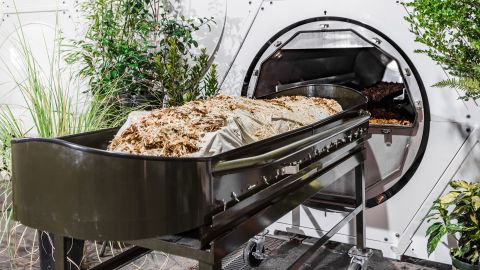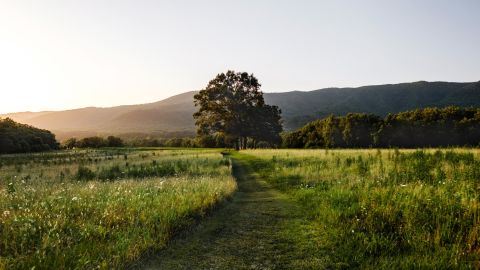CNN
—
The human body can be measured by many metrics. One is roughly one cubic yard (0.8 cubic meters) – that’s how much compost a corpse produces when combined with plant material and allowed to rot down for six to 10 weeks.
That figure, calculated by Seattle-based human composting company Recompose, demonstrates just how much rich organic goodness we leave behind when we shuffle off this mortal coil – and how much we could be putting to environmental use.
The green burial movement is not only finding ways to reduce the environmental impact of funerals, but finding ways for people to make a positive impact after death. The latest idea, soon to be rolled out in the United States by New York-based startup Transcend, will offer people the chance to “become” a tree after they die.
Transcend describes the process as follows: Customers choose a tree species suitable for their preferred burial site, on land owned by the company. When the client dies, their body is prepared in biodegradable flax linen and buried surrounded by a mixture of wood chips, local soil and fungi to facilitate composting. Planted over the body is a two-to-four-year-old tree, capable of absorbing the rich flush of nutrients released by the corpse. The site is marked with a memorial and the tree left to grow.
Transcend says it hasn’t yet confirmed the location of its first burial sites, but aims for them to be no further than two hours from a major city. Land is being selected in partnership with non-profit One Tree Planted based on its need for reforestation, and will be legally protected from future development.
The company was founded by serial entrepreneur Matthew Kochmann. “Where I personally lean towards on the green burial movement is, what’s the simplest, most natural process? What’s the way it was for millennia?” he tells CNN.
Kochmann was inspired by the “Capsula Mundi,” a biodegradable egg-shaped casket designed by Italians Raoul Bretzel and Anna Citelli, above which a tree could be planted. While the duo released a version suitable for cremated ashes, a model for a body was never put into production.
“By the end of 2023, we are hoping to have a few sites open and live and have planted several people,” says Kochmann. “But also starting (to get) people acting well in advance on their wishes, raising their hand and saying ‘I want to be a tree when I die.’”

The two dominant types of funerals in the US both have environmental drawbacks. Every year, traditional burials use millions of gallons of embalming fluid (including chemicals like formaldehyde), millions of feet of wood, over one million tons of concrete and thousands of tons of copper, bronze and steel, according to the Green Burial Council. The majority of Americans now opt for cremation, and though it does not take up land in the same way as a traditional burial, it produces 1.74 billion tons of CO2 emissions every year, as well as releasing certain heavy metals, including mercury, into the atmosphere.
It wasn’t always this way, says Jimmy Olson, of Olson Funeral Home and Cremation Service in Sheboygan, Wisconsin, an early adopter of modern green burial options.
The practice of embalming was ushered in during the US Civil War, he explains, and enclosing caskets in a concrete container was introduced after World War II to prevent graves from collapsing when heavy digging equipment and lawnmowers became common in cemeteries. “All we are doing here is going back to the way we did things 100 years ago,” he says of the natural burials he offers in meadows and wooded areas.
Caitlyn Hauke, past president of the Green Burial Council International, says that “many folks tend to think about traditional burial and cremation as their only choices, but once they learn about green burial (and other alternatives), they frequently reconsider.”

For those wanting to give back to the Earth in death, options have broadened in recent years. A form of cremation using liquids, known as “aquamation,” is legal in more than a dozen states, and can cut a large proportion of cremation’s carbon footprint while generating a nutrient-rich liquid fertilizer. Human composting is legal in a handful of states, most recently New York. Recompose, for example, composts bodies in individual containers into soil for loved ones to collect or donate to conservation efforts.
Transcend is “on a mission to reforest the world,” says Kochmann, and every tree burial purchased will pay for 1,000 trees to be planted by One Tree Planted, meaning customers can make an impact even before death.
Transcend has attracted high-profile support from the likes of Oscar-nominated filmmaker Darren Aronofsky, who serves on the company’s advisory board alongside human decomposition expert Jennifer DeBruyn, a microbial biologist at the University of Tennessee’s “Body Farm,” and One Tree Planted founder Matt Hill.
“It’s a tall task to get people to think about death straight on,” said Aronofsky at a recent Transcend panel discussion. “But people are very engaged in the story of the environment.”
According to a 2017 survey by the US National Funeral Directors Association (NFDA), just 21% of people had discussed their funeral plans with family, even though nearly two-thirds acknowledged the importance of doing so. “A lot of what we’re doing here is using the tree as a metaphor to draw people into an uncomfortable conversation,” Kochmann explains. “Nature does have the power to be a soothing conduit.”
“I don’t look at us as a death care company or a funeral company,” he adds. “The reason I started this company was to heal society’s relationship with death.”

How to be good to the planet when you die
03:47
– Source:
CNN
Priced at $8,500, Transcend’s funeral package is higher than the median cost of a funeral with burial ($7,848) or cremation ($6,971) in 2021, according to NFDA data – but not drastically so.
Even if costs are competitive, overcoming reticence from the public is another matter. “I suspect, as with most new technologies, folks will want to see proof of concept and success with these new alternatives before they are widely embraced,” Hauke says.
Kochmann acknowledges that running a startup in funeral care is like no other industry. “This isn’t an app that we can turn on and then say, ‘Oh, whoops, we ran out of money.’ The second we take one person’s loved one and put them in the ground … (we) have a responsibility for perpetual maintenance and care,” he explains.
The founder declined to put a figure on how many customers would be required to sign up to make the business viable in the long term. On its website, the company says that, “Even if Transcend were to close, all of our already performed Tree Burials would be 100% protected.”

Nevertheless, Kochmann says he’s optimistic the company will conduct its first burial in spring or summer this year, and is currently waiting for the first burial sites to be confirmed. “It’s a rigorous and complicated process, as you can imagine,” he says.
“Every state, county, city or municipality have different rules for burial and for what constitutes a cemetery,” explains Olson, who lists the Environmental Protection Agency, the Department of Natural Resources and municipal watershed programs as three of the agencies involved in approving burial sites.
Even before the first grave has been dug in the US, Kochmann is already thinking internationally and conducting research trips abroad, firm in his belief that tree burial can find acceptance across cultures and religions.
“Every single one of us … is going to need to deal with the consumer purchase decision of what to do with our remains,” he says. “This is something that can be offered to every single person on the planet.”